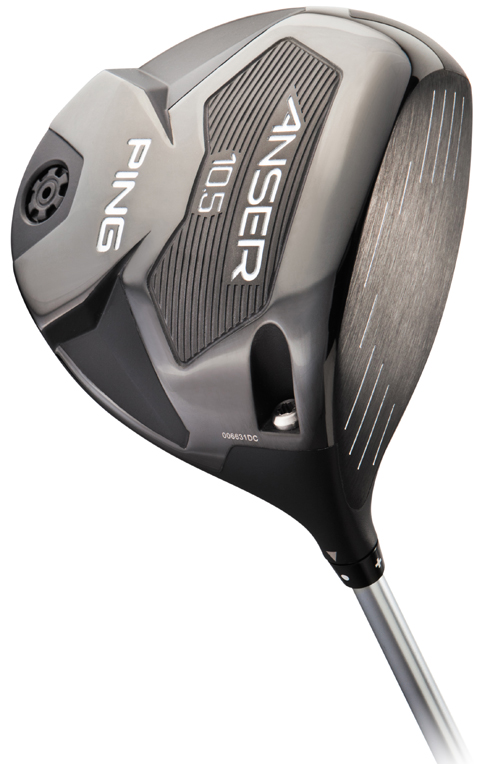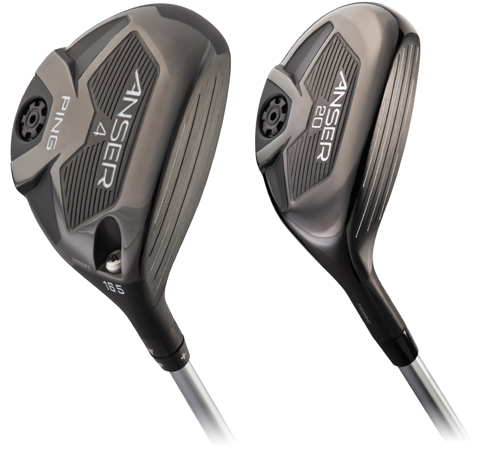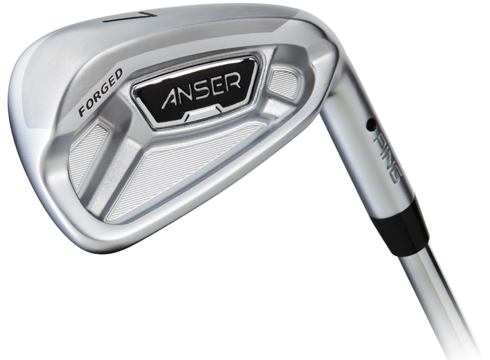 For a few years now, the big trend in the driver market has been the introduction of adjustable clubs. We first saw this with the TaylorMade R9 line and over the last few years the majority of companies have fallen in line and introduced some sort of adjustable driver. Up until this point, PING has stayed away from this market, but with the updated Anser line (which also includes fairway woods, hybrids, and irons) PING now has an adjustable driver.
For a few years now, the big trend in the driver market has been the introduction of adjustable clubs. We first saw this with the TaylorMade R9 line and over the last few years the majority of companies have fallen in line and introduced some sort of adjustable driver. Up until this point, PING has stayed away from this market, but with the updated Anser line (which also includes fairway woods, hybrids, and irons) PING now has an adjustable driver.
The major addition with the update of the Anser line, of course, is the new Anser driver. The driver features a low spin head with the same matte black paint job found on the i20 driver. The head is 460 cc and is made from a light low density alloy. The big feature, however, is the adjustably that PING has added to the driver. Manufacturers who have gotten into the adjustable driver market tend to go one of two ways… they either go kind of crazy with the different features and settings that can be tweaked or they keep it so only one or two simple adjustments can be made. PING has definitely gone the latter as the only thing that is adjustable is the loft of the club. Basically, the club allows for three settings; the standard loft and then either plus or minus one half degree. PING has worked hard, however, to limit the size of the hosel to one you would typically see on a non adjustable driver, giving the club a classic look at address. Adjustments to the club are made using a torque wrench supplied by PING.

While the adjustability options may be limited compared to those of other manufacturers, the stock shaft offerings are not. There are four available stock shafts with each offering different weights, stiffness profiles and trajectories. This almost guarantees that golfers will find one that fits their swing as well as their desired trajectory and ball flight. The shafts are the PING TFC 800D (available in soft R, R, S, and X), the Aldila Phenom 50 (R and S), the Fujikura Blura Blur Red (R, S, and X), and the Mitsubishi Diamana ‘ahina 70 (S and X).
Along with the new driver are matching fairway woods and hybrids. Through the same “trajectory tuning,” as PING is calling it, the fairway woods (but not the hybrids) can have 1/2 degree either added or taken away from the standard loft. Both the fairway woods and hybrids are made from 17-4 stainless steel and the woods feature more surface area on the bottom of the club face to aid in proper ball contact. In addition to that, a rear sole weight has been put into the woods to lower the center of gravity to promote lower, and more penetrating ball flights. The hybrids on the other hand feature progressive center of gravity locations to promote higher launches and better accuracy which ensures that players of all abilities will be able to play them. In lower lofted hybrids, the CG is lower in further back in the club and as the loft increases the CG moves further forward. Like the woods, the lower portion of the face is wide to induce optimal ball contact. Both clubs also feature the same, non-glare, matte black finish that the driver has. The stock shaft on the fairway wood is the TFC 800f and the hybrids have the TFC 800h, both available in soft R, R, and S flexes.

The driver, woods, and hybrids aren’t all however as there are also the Anser Forged Irons. The irons are made from 8620 shell and have a tungsten weight and internal cavity to optimize the clubs center of gravity as well as increase their moment of inertia. The irons feature progressive stabilizing bar technology which helps to create ball flights that are more predictable. In the long irons, the bars are angled out wider and are thin which lowers the CG and launches the ball high. As you move down though the set, the barges get thicker and more vertical to give more control as well as a more penetrating ball flight. The irons are available in a 3-PW set in either steel (Project X; 5.0, 5.5, 6.0, or 6.5) or graphite (TFC 800i; soft R, R, or S)

The prices for the Anser line of clubs are as follows: the driver goes for $399, fairway woods for $249, hybrids for $229, and the irons for $1269. The driver is available in 8.5°, 9.5°,10.5°, or 12° while the woods are available in 14.5° (3 wood), 16.5° (4 wood), and 18.5° (5 wood). As stated earlier both the driver and fairway woods can be adjusted 1/2 degree in either direction. The hybrids are available in lofts of 17°, 20°, 23°, and 27°.

I traded in my i20’s for the Anser irons. I was very happy with the i20’s. The problem came when I demo’d the Anser irons. The feel is soft with distance control and I can limit my draw from a hook and even hit it straight and can fade it some.
It took half a round to get used to them. Now, I wish every club I have was forged 😉
I bought the Ping Anser hybrid 27 degree. My initial impressions are that it is an excellent club. Shots tend to go long and straight from fairway or rough, not quite so well from tight lies. Over all, I am pleased.